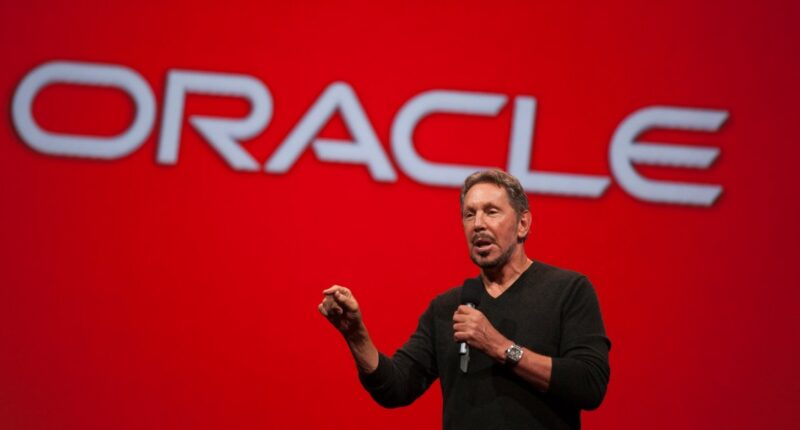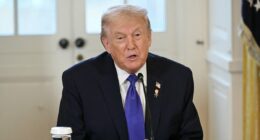Share this @internewscast.com
Throughout most of his career, Larry Ellison let Oracle play the role of the company in the background, providing the technology that makes headlines, particularly through its cloud computing and database solutions sold to enterprise clients like DHL, Northwell Health, and Fanatics. However, in his 80s, Ellison has embarked on a new chapter, transitioning from a Silicon Valley trailblazer to a media mogul.
Unlike many of his peers on the Forbes Billionaires list, Larry Ellison typically maintains a low profile. That’s not to say he’s been without media attention, especially in recent years. However, he and Oracle aren’t often summoned to high-profile congressional hearings or blamed in op-eds for negatively impacting an entire generation.
Throughout his career, Ellison has developed a reputation for being ruthless, sometimes engaging in ethically questionable behavior as Oracle’s leader. Biographer Karen Southwick compared him to a “modern-day Genghis Khan” in her book Everyone Else Must Fail: The Unvarnished Truth About Oracle and Larry Ellison, published in 2003. She depicted Ellison as someone who would do whatever it took to maintain absolute control over his company or industry, including removing executives “who dare to stand up to him” and performing hostile takeovers of competitors. He went so far as to purchase most of a Hawaiian island, whose residents are notably enthusiastic in their regard for him.
Ellison’s entry into the media field began modestly by supporting Annapurna Pictures and Skydance Productions, founded by his children Megan and David Ellison, respectively. Both companies eventually grew into major entities in the television and video game industries. Since then, his ventures have significantly intensified.
In 2018, amidst financial difficulties at his daughter’s studio Annapurna, Ellison expanded his involvement. Although his exact role in daily operations wasn’t clear, he led a reorganization, arranged to settle the $200 million debt, and altered the company’s film financing strategy. Instead of relying on bank loans, Annapurna would look for investors per project or have Megan Ellison finance them entirely.
In 2022, Larry Ellison contributed $1 billion to aid Elon Musk in acquiring Twitter (now X). And last year, Skydance Media merged with Paramount, forming a formidable conglomerate. While on paper his son David runs Paramount, it is Larry Ellison who truly owns the firm. Consequently, he now holds a controlling stake in a broadcast network (CBS), a significant streaming service (Paramount+), various film studios, CBS News, and pay-TV channels like Nickelodeon, MTV, Comedy Central, and Showtime.
And now Oracle is likely going to own a major portion of TikTok in the US. Many details of the deal are still murky, and there’s been some contradictory reporting about what will and won’t remain in ByteDance’s control. But as Clare Malone says in a recent New Yorker article, it’s unlikely the deal will do much to address any of the supposed national security concerns around TikTok and, “instead, the deal’s more immediate impact would be to bolster an emerging media conglomerate, under the auspices of the Ellison family, who are assiduously friendly to Trump.”
I think Malone is underselling things quite a bit in describing the family’s empire as “emerging” however. Paramount Skydance is already one of the largest media conglomerates in the world. And one that has shown a willingness to make decisions destined to please the president, like pushing a prominent critic of the administration in Stephen Colbert, off the air. David Ellison is also rumored to be in talks to acquire Bari Weiss’ The Free Press, and “the new owner of CBS News is weighing giving Ms. Weiss the job of editor in chief or co-president of the network,” according to the New York Times. Weiss portrays herself as a sort of centrist provocateur, though the most frequent target of her antagonism is the “mainstream media,” a foil that lines up nicely with the White House’s interests.
Some of this embracing of right wing interests and offering tokens of appeasement might seem par for the course to keep the White House off your back as a media company in 2025. But Larry Ellison’s behavior over the last 40-plus years has shown he won’t let things like rules, or even good sportsmanship, stand in the way of him getting what he wants. Oracle’s yachting team was caught cheating at the 2013 America’s Cup and Ellison famously hired private detectives to dig up dirt on Microsoft and Bill Gates during the company’s monopoly woes in 1999.
Now Paramount is reportedly looking to acquire Warner Bros. Discovery, which would give the family ownership of another major movie studio, another major streaming service (HBO Max), CNN, and more. To call the scope such a merger unprecedented would be dramatically underselling things.
What makes this family empire so unique is, as the New York Times points out, if he wants to continue to build out his budding media monolith, money isn’t a constraint. Larry Ellison’s wealth fluctuates by as much as $100 billion a day — more than the GDP of roughly two-thirds of the world’s countries according to the International Monetary Fund. While Ellison hasn’t shown much of a penchant for running a media company so far, his staggering wealth gives him plenty of leeway for making mistakes and learning on the job.
Larry Ellison already had his hands on a significant amount of American medical and financial data through Oracle. He’s helped build some of the world’s largest AI datacenters. Last year he added a major news outlet and traditional media conglomerate to his portfolio and, unless something unexpected happens, he’ll wield significant influence over one of the world’s biggest social media networks. In what feels like record time Larry Ellison has gone from a relatively lowkey, if excessively wealthy and flamboyant, tech CEO to one of the most powerful people in the world. And all the while his politics seem to be taking a more conspiratorial bent.






